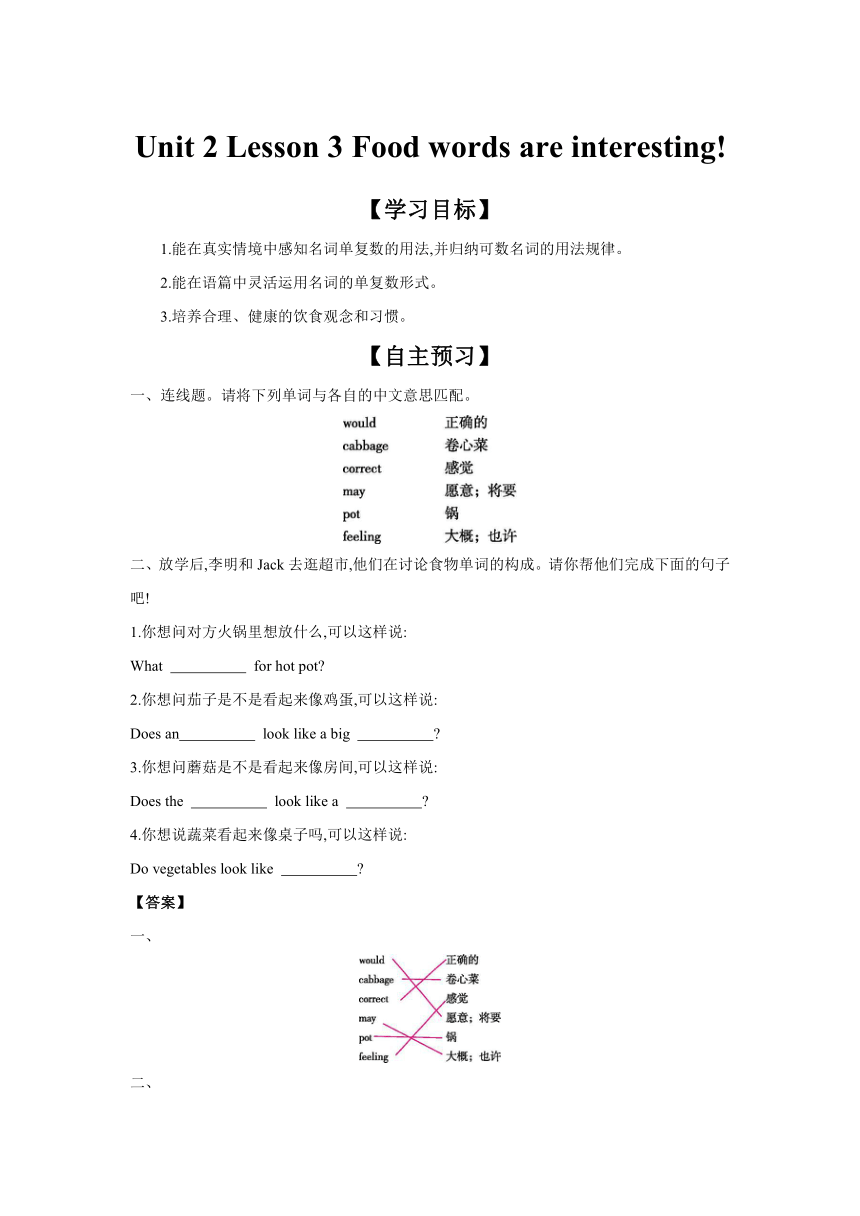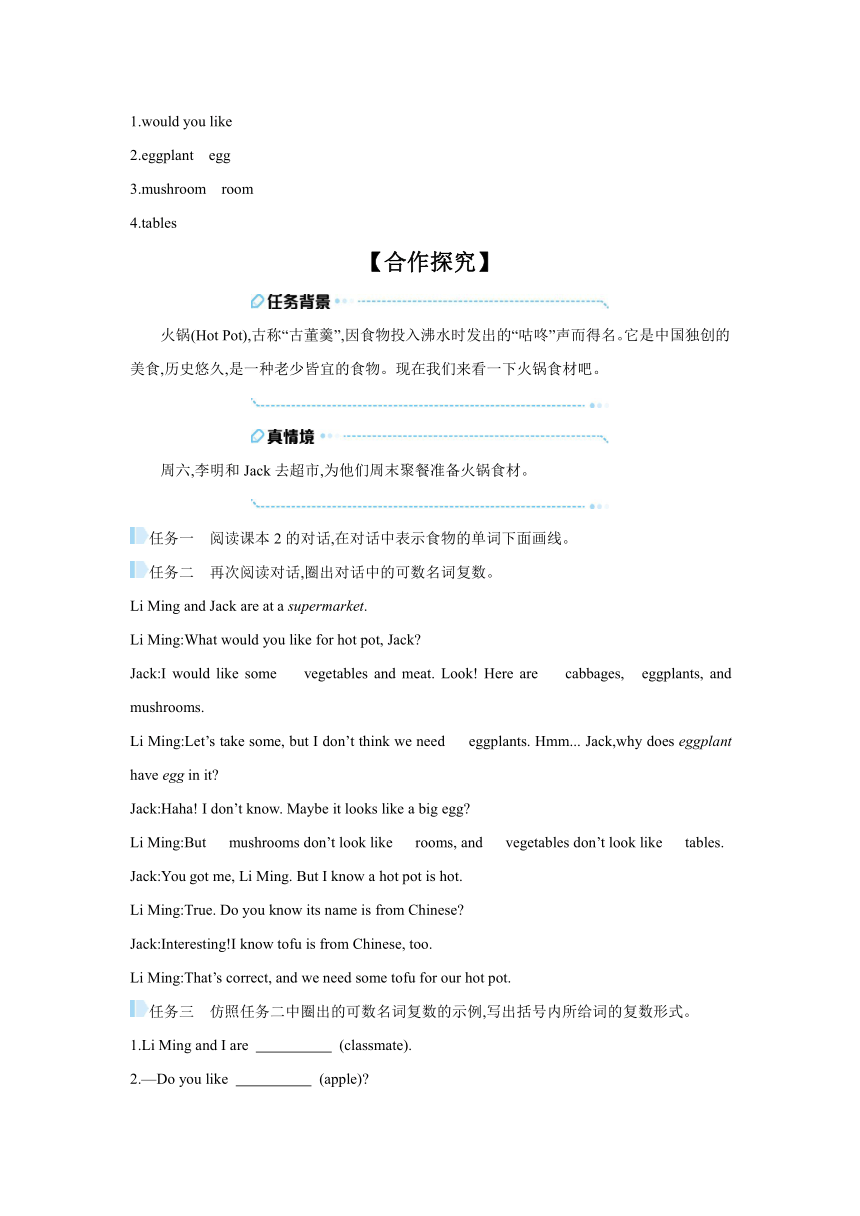【学习任务单】Unit 2 Lesson 3 Food words are interesting(含答案) 2024-2025学年英语冀教版七年级上册
文档属性
| 名称 | 【学习任务单】Unit 2 Lesson 3 Food words are interesting(含答案) 2024-2025学年英语冀教版七年级上册 |

|
|
| 格式 | docx | ||
| 文件大小 | 67.6KB | ||
| 资源类型 | 教案 | ||
| 版本资源 | 冀教版 | ||
| 科目 | 英语 | ||
| 更新时间 | 2024-12-26 20:10:05 | ||
图片预览



文档简介
Unit 2 Lesson 3 Food words are interesting!
【学习目标】
1.能在真实情境中感知名词单复数的用法,并归纳可数名词的用法规律。
2.能在语篇中灵活运用名词的单复数形式。
3.培养合理、健康的饮食观念和习惯。
【自主预习】
一、连线题。请将下列单词与各自的中文意思匹配。
二、放学后,李明和Jack去逛超市,他们在讨论食物单词的构成。请你帮他们完成下面的句子吧!
1.你想问对方火锅里想放什么,可以这样说:
What for hot pot
2.你想问茄子是不是看起来像鸡蛋,可以这样说:
Does an look like a big
3.你想问蘑菇是不是看起来像房间,可以这样说:
Does the look like a
4.你想说蔬菜看起来像桌子吗,可以这样说:
Do vegetables look like
【答案】
一、
二、
1.would you like
2.eggplant egg
3.mushroom room
4.tables
【合作探究】
火锅(Hot Pot),古称“古董羹”,因食物投入沸水时发出的“咕咚”声而得名。它是中国独创的美食,历史悠久,是一种老少皆宜的食物。现在我们来看一下火锅食材吧。
周六,李明和Jack去超市,为他们周末聚餐准备火锅食材。
任务一 阅读课本2的对话,在对话中表示食物的单词下面画线。
任务二 再次阅读对话,圈出对话中的可数名词复数。
Li Ming and Jack are at a supermarket.
Li Ming:What would you like for hot pot, Jack
Jack:I would like some vegetables and meat. Look! Here are cabbages, eggplants, and mushrooms.
Li Ming:Let’s take some, but I don’t think we need eggplants. Hmm... Jack,why does eggplant have egg in it
Jack:Haha! I don’t know. Maybe it looks like a big egg
Li Ming:But mushrooms don’t look like rooms, and vegetables don’t look like tables.
Jack:You got me, Li Ming. But I know a hot pot is hot.
Li Ming:True. Do you know its name is from Chinese
Jack:Interesting!I know tofu is from Chinese, too.
Li Ming:That’s correct, and we need some tofu for our hot pot.
任务三 仿照任务二中圈出的可数名词复数的示例,写出括号内所给词的复数形式。
1.Li Ming and I are (classmate).
2.—Do you like (apple)
—Yes, I like them very much.
3.I’d like some (cake) and (vegetable) for dinner.
李明和Jack共同的好朋友Lily在超市看到他们两个人在挑选火锅食材。回家后,她拿起笔,流畅地写下了一篇短文,介绍了李明和Jack购买火锅食材的情况。
任务四 通读一遍对话后,用恰当的名词完成课本3的短文。
任务五 找出对话中的复数名词,并写出其单数形式。
1.
2.
3.
4.
5.
6.
7.
任务六 请你写一篇短文介绍一下你喜欢的美食吧。
My favourite food
_____________________________________________________________________
_____________________________________________________________________
_____________________________________________________________________
_____________________________________________________________________
、【答案】
任务二
vegetables cabbages eggplants mushrooms eggplants mushrooms rooms vegetables tables
任务三
1.classmates 2.apples 3.cakes vegetables
任务五
1.words word
2.mushrooms mushroom
3.vegetables vegetable
4.cabbages cabbage
5.eggplants eggplant
6.rooms room
7.tables table
任务六
My favourite food
I eat fruit every day. And fruit is my favourite food. It is delicious and it is good for my health. And it has many kinds, such as apples, pears, oranges and lemons. I can eat what I like every day. When I eat fruit, I feel very happy. Just as a saying goes, “An apple a day keeps a doctor away.” Of all the fruit, I like apples best. Fruit is so pretty and cute. I like fruit best.
【知识超市】
I would like some vegetables and meat. 我想要一些蔬菜和肉。
用法总结 名词可以分为可数名词与不可数名词,其中可数名词具有单、复数的形式;而不可数名词没有复数形式。
一、可数名词的复数形式
可数名词的单数变复数分为规则变化和不规则变化。
1.可数名词单数变复数规则变化
情况规则读音例词
一般情况 加-s -s在清辅音后发/s/音;在浊辅音和元音后 发/z/音 bike—bikes girl—girls
以 s、x、ch、sh 结尾的词 加-es -es读作 / z/ class— classes brush— brushes box—boxes watch— watches
以辅音字母+ y 结尾的词 变y为i再加-es -ies读作 / z/ family— families baby—babies
以f或 fe结尾的词 多数变f或fe为v再加 -es -ves读作 /vz/ knife— knives leaf—leaves wife—wives
以 o结尾的词 加 -es或 -s -es和-s 读作/z/ tomato— tomatoes potato— potatoes zoo—zoos photo— photos
2.可数名词单数变复数不规则变化
构成法例词
改变中间元音 man—men; woman—women; foot—feet
词尾加-en 或-ren ox—oxen; child—children
单复数形式相同 fish—fish; sheep—sheep; deer—deer; Chinese—Chinese
助学口诀:名词复数有规律,一般词尾加s;
辅音字母加y型,变y为i加es;
ch、sh真有趣,s、x加es;
f、fe真小气,字母v来把它替,es在后别忘记;
字母o来真神奇,有生命来es,没有生命加s。
二、不可数名词的数量表达
1.不可数名词没有单复数之分,但可借助单位量词 (piece、bag、tube 等)表示一定的数量。例如: a piece of bread 一片面包; two bags of rice 两袋大米
2.可用 much、little、some、a little、a lot of、lots of、plenty of 修饰不可数名词,表达大约的数量。例如: a little jam 一点果酱; some coffee 一些咖啡
助学口诀:牛肉(beef)鸡肉(chicken)拌米饭(rice);
鱼(fish)汤(soup)味道鲜;
果汁(juice)牛奶(milk)要常喝;
面包(bread)更是不能缺。
素养训练
一、写出下列名词的复数形式。
1.orange
2.class
3.woman
4.monkey
5.piano
6.foot
7.leaf
8.bed
9.fox
10.family
二、用括号内所给词的正确形式填空。
1.I have two (knife).
2.There are many (box) here.
3.There are many (bus) on the road.
4.A few (boy) are drawing on the wall.
5.The (child) are playing football now.
【答案】
一、
1.oranges 2.classes 3.women 4.monkeys 5.pianos 6.feet 7.leaves 8.beds 9.foxes 10.families
二、
1.knives 2.boxes 3.buses 4.boys 5.children
【学习目标】
1.能在真实情境中感知名词单复数的用法,并归纳可数名词的用法规律。
2.能在语篇中灵活运用名词的单复数形式。
3.培养合理、健康的饮食观念和习惯。
【自主预习】
一、连线题。请将下列单词与各自的中文意思匹配。
二、放学后,李明和Jack去逛超市,他们在讨论食物单词的构成。请你帮他们完成下面的句子吧!
1.你想问对方火锅里想放什么,可以这样说:
What for hot pot
2.你想问茄子是不是看起来像鸡蛋,可以这样说:
Does an look like a big
3.你想问蘑菇是不是看起来像房间,可以这样说:
Does the look like a
4.你想说蔬菜看起来像桌子吗,可以这样说:
Do vegetables look like
【答案】
一、
二、
1.would you like
2.eggplant egg
3.mushroom room
4.tables
【合作探究】
火锅(Hot Pot),古称“古董羹”,因食物投入沸水时发出的“咕咚”声而得名。它是中国独创的美食,历史悠久,是一种老少皆宜的食物。现在我们来看一下火锅食材吧。
周六,李明和Jack去超市,为他们周末聚餐准备火锅食材。
任务一 阅读课本2的对话,在对话中表示食物的单词下面画线。
任务二 再次阅读对话,圈出对话中的可数名词复数。
Li Ming and Jack are at a supermarket.
Li Ming:What would you like for hot pot, Jack
Jack:I would like some vegetables and meat. Look! Here are cabbages, eggplants, and mushrooms.
Li Ming:Let’s take some, but I don’t think we need eggplants. Hmm... Jack,why does eggplant have egg in it
Jack:Haha! I don’t know. Maybe it looks like a big egg
Li Ming:But mushrooms don’t look like rooms, and vegetables don’t look like tables.
Jack:You got me, Li Ming. But I know a hot pot is hot.
Li Ming:True. Do you know its name is from Chinese
Jack:Interesting!I know tofu is from Chinese, too.
Li Ming:That’s correct, and we need some tofu for our hot pot.
任务三 仿照任务二中圈出的可数名词复数的示例,写出括号内所给词的复数形式。
1.Li Ming and I are (classmate).
2.—Do you like (apple)
—Yes, I like them very much.
3.I’d like some (cake) and (vegetable) for dinner.
李明和Jack共同的好朋友Lily在超市看到他们两个人在挑选火锅食材。回家后,她拿起笔,流畅地写下了一篇短文,介绍了李明和Jack购买火锅食材的情况。
任务四 通读一遍对话后,用恰当的名词完成课本3的短文。
任务五 找出对话中的复数名词,并写出其单数形式。
1.
2.
3.
4.
5.
6.
7.
任务六 请你写一篇短文介绍一下你喜欢的美食吧。
My favourite food
_____________________________________________________________________
_____________________________________________________________________
_____________________________________________________________________
_____________________________________________________________________
、【答案】
任务二
vegetables cabbages eggplants mushrooms eggplants mushrooms rooms vegetables tables
任务三
1.classmates 2.apples 3.cakes vegetables
任务五
1.words word
2.mushrooms mushroom
3.vegetables vegetable
4.cabbages cabbage
5.eggplants eggplant
6.rooms room
7.tables table
任务六
My favourite food
I eat fruit every day. And fruit is my favourite food. It is delicious and it is good for my health. And it has many kinds, such as apples, pears, oranges and lemons. I can eat what I like every day. When I eat fruit, I feel very happy. Just as a saying goes, “An apple a day keeps a doctor away.” Of all the fruit, I like apples best. Fruit is so pretty and cute. I like fruit best.
【知识超市】
I would like some vegetables and meat. 我想要一些蔬菜和肉。
用法总结 名词可以分为可数名词与不可数名词,其中可数名词具有单、复数的形式;而不可数名词没有复数形式。
一、可数名词的复数形式
可数名词的单数变复数分为规则变化和不规则变化。
1.可数名词单数变复数规则变化
情况规则读音例词
一般情况 加-s -s在清辅音后发/s/音;在浊辅音和元音后 发/z/音 bike—bikes girl—girls
以 s、x、ch、sh 结尾的词 加-es -es读作 / z/ class— classes brush— brushes box—boxes watch— watches
以辅音字母+ y 结尾的词 变y为i再加-es -ies读作 / z/ family— families baby—babies
以f或 fe结尾的词 多数变f或fe为v再加 -es -ves读作 /vz/ knife— knives leaf—leaves wife—wives
以 o结尾的词 加 -es或 -s -es和-s 读作/z/ tomato— tomatoes potato— potatoes zoo—zoos photo— photos
2.可数名词单数变复数不规则变化
构成法例词
改变中间元音 man—men; woman—women; foot—feet
词尾加-en 或-ren ox—oxen; child—children
单复数形式相同 fish—fish; sheep—sheep; deer—deer; Chinese—Chinese
助学口诀:名词复数有规律,一般词尾加s;
辅音字母加y型,变y为i加es;
ch、sh真有趣,s、x加es;
f、fe真小气,字母v来把它替,es在后别忘记;
字母o来真神奇,有生命来es,没有生命加s。
二、不可数名词的数量表达
1.不可数名词没有单复数之分,但可借助单位量词 (piece、bag、tube 等)表示一定的数量。例如: a piece of bread 一片面包; two bags of rice 两袋大米
2.可用 much、little、some、a little、a lot of、lots of、plenty of 修饰不可数名词,表达大约的数量。例如: a little jam 一点果酱; some coffee 一些咖啡
助学口诀:牛肉(beef)鸡肉(chicken)拌米饭(rice);
鱼(fish)汤(soup)味道鲜;
果汁(juice)牛奶(milk)要常喝;
面包(bread)更是不能缺。
素养训练
一、写出下列名词的复数形式。
1.orange
2.class
3.woman
4.monkey
5.piano
6.foot
7.leaf
8.bed
9.fox
10.family
二、用括号内所给词的正确形式填空。
1.I have two (knife).
2.There are many (box) here.
3.There are many (bus) on the road.
4.A few (boy) are drawing on the wall.
5.The (child) are playing football now.
【答案】
一、
1.oranges 2.classes 3.women 4.monkeys 5.pianos 6.feet 7.leaves 8.beds 9.foxes 10.families
二、
1.knives 2.boxes 3.buses 4.boys 5.children
同课章节目录
